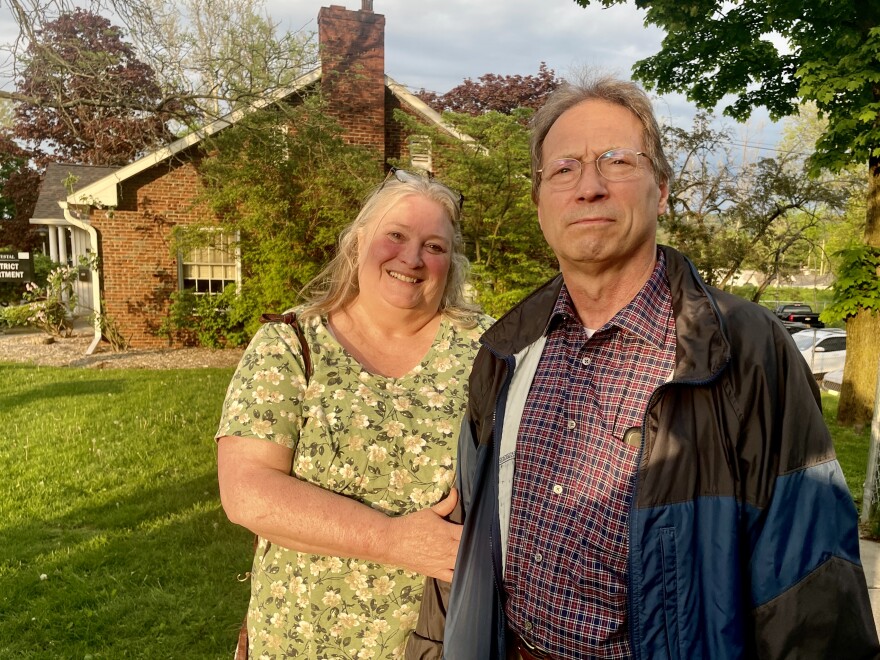The town of Vestal is considering whether to instate a moratorium on solar farm developments, reigniting a controversial debate that many landowners believed had come to a close.
The moratorium, which would last 12 months, would prevent the approval of proposed commercial solar farms and any related construction applications, essentially halting solar developments in the town.
The town board will vote on the moratorium next month. It comes after the town passed a solar energy law last year, clearing the path for solar developments and ending the town’s previous solar moratorium.
“We really had thought we would be very close to having the solar farm started by now,” said Sally Yablonsky after a public hearing on the moratorium last week. “They're fighting us tooth and nail to not put it in.”
Yablonsky has been working with Massachusetts-based ClearPath Energy to develop plans for a solar farm on her land for over a year. But now, with the possibility of another moratorium, she worries she won’t be able to continue to afford to maintain the land, which has been in her family for 225 years, she said.
The state energy authority, NYSERDA, provides a guidebook for local governments on how to manage solar developments, including a model solar energy law. It also cautions communities about the use of moratoria, noting that such laws are often litigated, and can be invalidated by the courts for suspending a landowner’s right to use their property.
But town officials have said Vestal remains unprepared to welcome solar development. The new moratorium would provide the town board with time to determine where solar farms can be located and whether further regulation is necessary, according to the legislation.
“I know that we have residents that would like solar farms right away, and have been waiting for a long time,” said Vestal Town Supervisor Maria Sexton at the public hearing last week. “However, dutifully and carefully, we've gone over everything that we need to look at in order to consider each solar farm project. And we do not feel that we are prepared.”

To Yablonsky and other landowners waiting to move forward on solar developments, the potential new moratorium threatens plans of generating income from renewable energy projects. Large and small-scale solar farms have cropped up across the state as New York works towards its commitment of obtaining 70 percent of the state's electricity from renewable sources by 2030, with 10,000 megawatts of solar –– a goal it remains behind on.
But some Vestal residents and landowners welcomed the proposed moratorium, voicing concern at the public hearing that solar developments could be a threat to the rural beauty they cherish.
“I'm for solar farms, but in the right place,” said Stephanie Harrington, whose land neighbors one of the proposed developments. “This is not the right place.”
Harrington said she would rather solar farms be built in areas far from houses, where they would not obstruct views from rural homes. She also echoed concerns of some other residents, who worried that solar developments could introduce pollutants to the area.
Tom McCartney, chairman of the Town of Vestal Fire District governance committee, urged the town board to consider fire risk when determining how to regulate solar farms. The developments could require new fire safety equipment and further training, he said.
Those are concerns that Robert Romine, a solar project developer from ClearPath Energy, wishes he could have addressed. The company provides training to fire departments and plans projects to minimize impacts to neighboring property owners, he said.
But Sexton, the town supervisor, refused to let Romine speak at the hearing, declaring that only Vestal residents and landowners would be permitted to give testimony.
“It’s unfortunate,” said Romine, who has worked with Yablonksy to develop a solar proposal for her land. He said he has offered to hold Q&A sessions and town halls to provide information to the public. “We just haven't been taken up on any of that,” he added.
Town Clerk Debra Wallace said after the meeting that Sexton’s move to limit testimony contradicted the state’s guidelines for public meetings. Those guidelines advise that local governments cannot require those who attend a hearing to identify themselves by name, residence or interest, and that any member of the public may testify during a public hearing.
In response to questions from WSKG about the decision to prohibit Romine from testifying, Sexton said the board pushed the vote on the moratorium to allow for further public comment.
The moratorium vote was initially scheduled for May 22, but will now be held on June 12. At that meeting, there will be a second public hearing and representatives from solar companies will be allowed to speak, Sexton said.
The stakes are high for solar projects in the area, as landowners and developers are uncertain of whether their projects — several of which they have already submitted applications for — will ever move forward.
“The discussion and eventual passage of the existing solar law last year was a clear signal that reasonable community solar projects would be allowed,” said Romine in an email Tuesday. If the moratorium passes, “it will be challenging for us to continue to invest in the development of this project,” he added.


